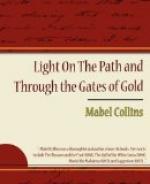“The Meaning of Pain” is considered in a way which throws a great light on the existence of that which for ages has puzzled many learned men. “Pain arouses, softens, breaks, and destroys. Regarded from a sufficiently removed standpoint, it appears as a medicine, as a knife, as a weapon, as a poison, in turn. It is an implement, a thing which is used, evidently. What we desire to discover is, who is the user; what part of ourselves is it that demands the presence of this thing so hateful to the rest?”
The task is, to rise above both pain and pleasure and unite them to our service. “Pain and pleasure stand apart and separate, as do the two sexes; and it is in the merging, the making the two into one, that joy and deep sensation and profound peace are obtained. Where there is neither male nor female, neither pain nor pleasure, there is the god in man dominant, and then is life real.”
The following passage can hardly fail to startle many good people: “Destiny, the inevitable, does indeed exist for the race and for the individual; but who can ordain this save the man himself? There is no clew in heaven or earth to the existence of any ordainer other than the man who suffers or enjoys that which is ordained.” But can any earnest student of Theosophy deny, or object to this? Is it not a pure statement of the law of Karma? Does it not agree perfectly with the teaching of the Bhagavat-Gita? There is surely no power which sits apart like a judge in court, and fines us or rewards us for this misstep or that merit; it is we who shape, or ordain, our own future.
God is not denied. The seeming paradox that a God exists within each man is made clear when we perceive that our separate existence is an illusion; the physical, which makes us separate individuals, must eventually fall away, leaving each man one with all men, and with God, who is the Infinite.
And the passage which will surely be widely misunderstood is that in “The Secret of Strength.” “Religion holds a man back from the path, prevents his stepping forward, for various very plain reasons. First, it makes the vital mistake of distinguishing between good and evil. Nature knows no such distinctions.” Religion is always man-made. It cannot therefore be the whole truth. It is a good thing for the ordinary and outside man, but surely it will never bring him to the Gates of Gold. If religion be of God how is it that we find that same God in his own works and acts violating the precepts of religion? He kills each man once in life; every day the fierce elements and strange circumstances which he is said to be the author of, bring on famine, cold and innumerable untimely deaths; where then, in The True, can there be any room for such distinctions as right and wrong? The disciple, must as he walks on the path, abide by law and order, but if he pins his faith on any religion whatever he will stop at once, and it makes no matter whether he sets up Mahatmas, Gods, Krishna,




